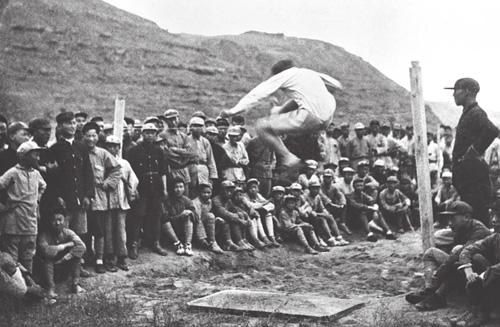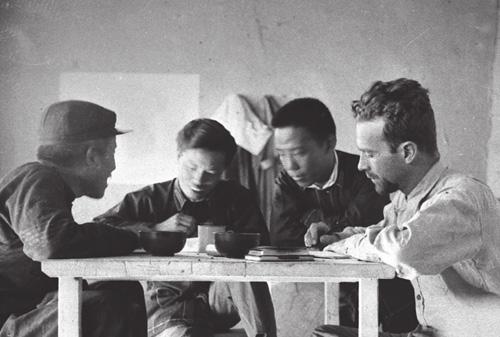Red Star Still Shining
2018-05-22


This year marks the 80th anniversary of the release of the fi rst Chinese edition of U.S. author Edgar Snows Red Star Over China, a masterpiece that gives an inside account of the Communist Party of China (CPC)-led revolution. The following is an edited version of a Xinhua News Agency report exploring the enduring appeal of Snows book:
Four score and two years ago, a 31-yearold American ventured into a no-go zone in a remote part of the Loess Plateau in northwest China with many questions in mind.
Who were the Chinese Communists? How did they dress, eat, play, love and work? What were the chances of the Red Army winning? What was their leader Mao Zedong like?
Journalist Edgar Snow entered, stayed and reemerged from within their ranks with little doubt that the almost isolated fi ghting force led by the CPC would ultimately succeed.
He penned a book Red Star Over China, giving a rare, detailed and at times brilliant account of the revolutionary movement the world knew so little about.
The book took the West by storm and in 1938, the Chinese version hit the market. Now regarded as a classic, it has inspired China from the days of Mao to the present.
Eighty years later, the book is once again becoming widely read as people seek to better understand the CPC. The same political party that Snow introduced to the world is now behind the wheel of the worlds second largest economy as it drives ever closer to the center of the global stage.
True, untold stories
Snows book provides an authentic account of the CPC and its long struggle to carry out the most profound revolution in Chinas history.
“The books charm is its true account of reality,” said Cao Wenxuan, a celebrated writer and Peking University professor, at a symposium in late April to mark the 80th anniversary of the books fi rst Chinese edition.
Described by some at the time as “the scoop of the century,” it continues to enjoy a reputation as an excellent work of journalism, especially in a climate of surging fake news and exaggerated media hype over the “threat”posed by China.
Until the books publication, Mao and his comrades had been known in the West as “Red bandits” fi ghting a losing guerrilla war. Reports about them often relied on hearsay or were pure fabrication as the Red zone was under blockade.
But Snow was undeterred and his trip to Baoan, the provisional CPC headquarters near present day urban Yanan, opened his eyes to the truth. Snow was one of the fi rst outsiders to gain an inside look at the Chinese Communists.
Snow wrote about Mao, Zhou Enlai and other revolutionary leaders, alongside whom he lived for four months in the regions hillside caves.
“I remember a chapter in which Mao talks about his childhood,” said Men Liangjie, a journalism major at Tsinghua University. “I felt like I was also sitting in that cave with Snow, listening to Mao.”
Gordon H. Chang, a professor of history at Stanford University, described his experience of reading the book as “electrifying.”
“No other Westerner had presented such insight into Chinese Communism before,”Chang said. “Snow was a singular individual who came along at the right moment. He was an excellent writer and a keen observer of history.”
“It was not just sympathetic, but appeared to be grounded in real sources and observations. It felt truthful and I think many others who read it, even today, feel similarly,” he said.
Secrets to success
The book has become a must-read for people, Chinese or otherwise, keen to learn about the CPCs revolutionary past.
Chinese versions of Red Star Over China have proliferated over time with one recent edition selling 3 million copies in just over a year. The Ministry of Education has also suggested that the book be a must-read for middle school students.
On Douban, a popular online review site for literary works, around 10 Chinese editions of Red Star Over China can be found, all with a rating of more than eight out of 10.
One of the most liked comments on Douban stated that the book provides the answer to the question of “how the CPC was able to succeed.”
Many still fi nd this question relevant today.
Snow discovered that Communism genuinely stirred many young Chinese, eager and daring to pursue great dreams despite the diffi culties of the time.
Soldiers of the Red Army were described by Snow as “unbeatable” with “sheer dogged endurance” and the “ability to withstand hardship without complaint.” The epic Long March was a perfect example of this fortitude.
Snow wrote about how the Red Army, whose members were mostly poor peasants, had trekked mountains, crossed rivers, survived on little food and dodged the pursuit of the Kuomintang in the journey to reach Yanan.
“That had a big impact on Western readers,” said Wu Shulin, Executive Deputy Director General of the Publishers Association of China.“The Red Army, in its resilience and ability to overcome hardships, was admirable.”
The Communists also won support from the masses who suffered under the Kuomintang regime.
The CPC introduced extremely popular policies in the Red zone: eliminating opium, child slavery and forced marriage while promoting mass education.
Their honest, upright and down-to-earth manner had a strong appeal, especially compared with the superiority, arbitrariness and corruption of the Kuomintang.
The Red Army had a growing number of new recruits as it was billed “a poor mans army.”
“Snow wrote about how many soldiers enlisted for that simple reason,” said Cao.
At the end of his book, Snow wrote that the Communist revolution would eventually win. Its triumph, according to Snow, would be “so mighty, so irresistible in its discharge of catabolic energy.”
New Long March
Todays China is a world apart from the Baoan of the 1930s. Yet the CPC carries on its traditions. The Chinese leadership has called on fellow comrades to remain true to their original aspiration: “Never forget why you started, and you can accomplish your mission.”
This mission has always been the same: to seek happiness for the Chinese people and the rejuvenation of the Chinese nation. But now the CPC has set a more concrete goal—to build China into a great modern socialist country by the middle of the century.
On the road to this new goal, the CPC is leading a new Long March. Until 2021, particularly arduous efforts are required to fi ght battles against extreme poverty, fi nancial risk and pollution, Chinas leaders have said.
Meanwhile, a Long March to improve cadres conduct has already begun.
Over the past fi ve years, large and long-running campaigns to rid the Party of corruption and undesirable conduct have been launched, leading to signifi cant improvement in the political ecosystem.
Scholars say that this refl ects efforts to return to the Party traditions that gave it popular support in its victory in the great revolution.
“It is to Snows credit that we see how the revolution grew from the start,” Cao said. “It is the simple code of conduct, the ‘three rules of discipline and eight points for attention that the CPC enforced from the very start, th at gives the Party its strength.”
Snow died in Switzerland in 1972. As per his wishes, some of his ashes were buried at Peking University.
Inscribed on the tombstone are the words in Chinese and English “Edgar Snow, American friend of the Chinese people.”
